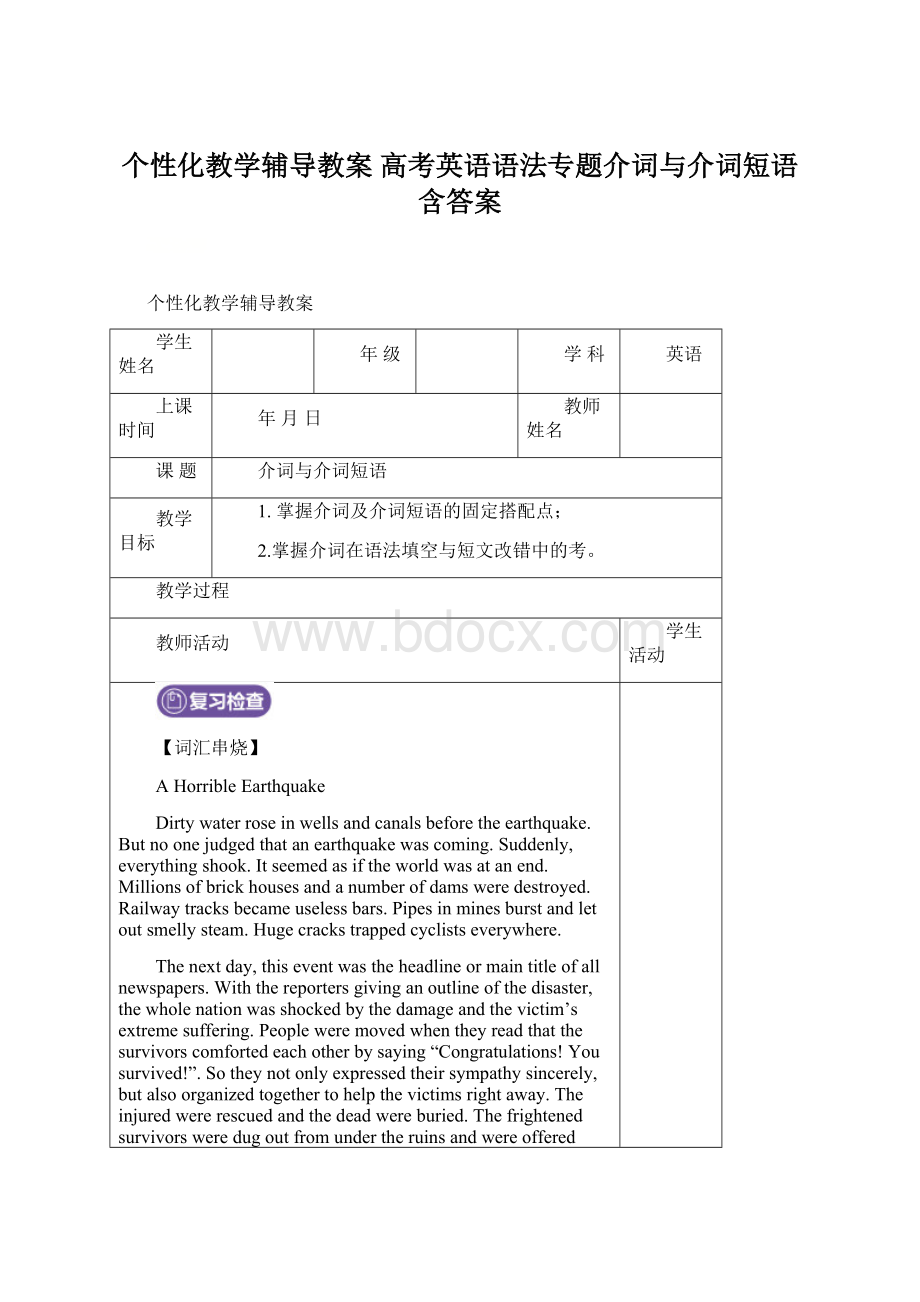个性化教学辅导教案 高考英语语法专题介词与介词短语 含答案.docx
《个性化教学辅导教案 高考英语语法专题介词与介词短语 含答案.docx》由会员分享,可在线阅读,更多相关《个性化教学辅导教案 高考英语语法专题介词与介词短语 含答案.docx(16页珍藏版)》请在冰豆网上搜索。

个性化教学辅导教案高考英语语法专题介词与介词短语含答案
个性化教学辅导教案
学生姓名
年级
学科
英语
上课时间
年月日
教师姓名
课题
介词与介词短语
教学目标
1.掌握介词及介词短语的固定搭配点;
2.掌握介词在语法填空与短文改错中的考。
教学过程
教师活动
学生活动
【词汇串烧】
AHorribleEarthquake
Dirtywaterroseinwellsandcanalsbeforetheearthquake.Butnoonejudgedthatanearthquakewascoming.Suddenly,everythingshook.Itseemedasiftheworldwasatanend.Millionsofbrickhousesandanumberofdamsweredestroyed.Railwaytracksbecameuselessbars.Pipesinminesburstandletoutsmellysteam.Hugecrackstrappedcyclistseverywhere.
Thenextday,thiseventwastheheadlineormaintitleofallnewspapers.Withthereportersgivinganoutlineofthedisaster,thewholenationwasshockedbythedamageandthevictim’sextremesuffering.Peopleweremovedwhentheyreadthatthesurvivorscomfortedeachotherbysaying“Congratulations!
Yousurvived!
”.Sotheynotonlyexpressedtheirsympathysincerely,butalsoorganizedtogethertohelpthevictimsrightaway.Theinjuredwererescuedandthedeadwereburied.Thefrightenedsurvivorsweredugoutfromundertheruinsandwereofferedshelter,freshwaterandelectricity.Thankstopeople’shelp,thelosswasminimized.
可怕的地震
地震前,水井和运河里的污水都涨涌起来。
但是却没人判断出地震即将来临。
霎那间,一切都在摇晃,似乎整个世界就要结束。
数以百万的砖房和许多水坝遭到破坏;铁路轨道都变成无用的铁条;煤矿管道纷纷爆裂,发出有臭味的蒸汽;到处都有骑车的人被巨大的裂缝陷住。
第二天,所有报纸都纷纷以大字标题或主要标题报道了这一事件。
记者们描述了灾难的大概情况,全国都被地震的破坏和灾民们极度的苦难所震惊。
当人们读到幸存者以“恭喜啊,你还活着。
”来互相安慰时,都被感动了。
人们不仅衷心地表达了他们的同情,而且还立刻组织起来帮助灾民。
伤员被救助了,死者被埋葬了,吓坏的幸存者被从废墟中挖出来了,栖身处、净水和电力也很快得到提供。
多亏了人们的帮助,灾区的损失被减到了最小。
【词汇点拨】
earthquaken.地震
rightaway立刻;马上
welln.井
pipen.管;导管
burstvi.(burst,burst)爆裂;爆发n.爆发
eventn.事件;大事
asif仿佛;好像
atanend结束;终结
nationn.民族;国家;国民
canaln.运河;水道
steamn.蒸汽;水汽
dirtn.污垢;泥土
ruinn.废墟;毁灭vt.毁灭;使破产
sufferingn.苦难;痛苦
extremeadj.极度的
injurevt.损害;伤害
destroyvt.破坏;毁坏;消灭
brickn.砖;砖块
damn.水坝;堰堤
trackn.轨道;足迹;痕迹
shockvt.&vi.(使)震惊;震动n.休克;打击
rescuen.&vt.援救;营救
trapvt.使陷入困境n.陷阱;困境
electricityn.电;电流;电学
disastern.灾难;灾祸
buryvt.埋葬;掩埋;隐藏
titlen.标题;头衔;资格
reportern.记者
barn.条;棒;条状物
damagen.&vt.损失;损害
frightenvt.使惊吓;吓唬
frightenedadj.受惊的;受恐吓的
frighteningadj.令人恐惧的
congratulationn.祝贺;(复数)贺词
judgen.裁判员;法官vt.断定;判断;判决
sincerelyadv.真诚地;真挚地
expressvt.表示;表达n.快车;速递
【考点精练】
一、请根据各句上下文的意义,选择正确的单词填入空白处。
brick,electricity,organize,injure,judge,shake,rise,disaster,destroy,ruin,smelly,steam,honour,rescue,bury,dam,canal,burst,shock,prepare
1Hegot_________intherightlegwhileplayingfootballlastweek.
2Whenanearthquakecomespeoplecanfeelthehouse_________.
3Ifanuclearwarshouldbreakout,itwouldbringagreat_________toman.
4Mostofthebuildings_________intheearthquake.
5Fromyesterdayon,thetemperaturebeganto_________.
6Never_________apersononlybyhisclothes.
7Stonesand_________areusedtobuildahouse.
8Theclothesofthosewhosmokealotareoften__________.
9LiSiguangis__________asthefatherofgeologyinChina.
10ThreeGorges(峡)_______ontheChangjiangRiverisagreatprojectintheworld.
11Readingtheletter,she_________outcrying.
12Thestudentsarebusy__________fortheNewYear’sDayEvening.
13Hewasgreatly_________atthenewsofhisuncle’sdeath.
14Fivesoldiersweresentto_________thoseskierstrappedinthesnow.
15_________canbeseenrisingfromtheboilingkettle(水壶).
二、把下列短语填入每个句子的空白处(注意所填短语的形式变化):
rightawayatanenddigout
anumberofthousandsofgiveout
1__________workerswentonthestrike(罢工),butIdidn’tknowtheexactnumber.
2Justwaitformeonthespot;Iwillcome___________.
3Morethanadozenpeople___________oftheavalanche(雪崩)alive.
4Whenwearrivedatthecinema,thefilmwasnearly__________.
5__________peoplegatheredonthesquarewatchingthefireworks.
Born______[1]Peking,YuanLongpinggraduated______[2]SouthwestAgriculturalCollegeinChina______[3]1953,and______[4]hisgraduationhehasdevotedhimself______[5]agriculturaleducationandresearch.HispioneeringresearchhashelpedridChina______[6]hunger______[7]threedecades.In1973,______[8]cooperationwithothers,hewasabletocultivateatypeofhybridricespecieswhichhadgreatadvantages______[9]othersandwhoseoutputwouldincrease______[10]20percentthanthatofcommonones.
______[11]higheryieldsthanpreviousvarieties,ProfessorYuan’snewcrop,regarded______[12]thefifthinvention______[13]China’sFourMajorInventions,hasquicklyimprovedChina’sfoodsupply.______[14]anyhesitation,hesharedhisknowledge
andtechnologywithforeignscientists,sofarmersinmorethantenothercountries______[15]Chinahavethusbenefited______[16]hiswork,gainingaccess______[17]histechnology.
______[18]return,hewasawarded______[19]manyinternationalawardsforhisgreatachievements.Inhissparetime,Dr.Yuanlovesplayingtheviolinandlisteningtomusic.Everynight,hereads______[20]halfanhour______[21]varioustopicsbeforehegoestosleep.Buthecaresfornothingmorethanhisresearchandhegoestothefieldstwiceaday______[22]motorbike,whichhasleftastrongimpression______[23]us.
1.介词的固定搭配不熟悉
2.表示同一类的介词辨析不到位
介词和介词短语
介词又叫前置词,是一种虚词。
介词分为三种,一种是简单介词,如at,in,on,beside,to,for等;另一种是短语介词,即由两个以上的词组组成的短语,如infrontof,becauseof,outof,insteadof等;还有一种叫二重介词,如untilafter,frombehind等。
一、介词的句法功能
介词不能独立在句中做成份,介词后必须与名词、代词、或动名词构成介词短语在句中充当一个成份,表示人、物、事件等与其它人、物、事件等之间的关系。
1、作定语:
Thebookonthetableismine.
2、作状语:
Wehavebreakfastatseven.(表时间);
Theywerelateformeetingbecauseoftheheavyrain.(表原因)
Theystartedthemachinebypressingthebutton.(表方法)
3、作表语:
Mydictionaryisinthebag.
4、作宾语补足语:
Ifoundhimintheoffice.
二、主要介词区别
1、表示时间的at,in,on:
at表示片刻的时间,如:
at8o’clock
常用短语有:
atnoon,atnight,atmidnight,attheendof,atthattime,atthebeginningof,attheageof,atChristmas,atNewYear等
in表示一段的时间,如:
inthemorning,intheafternoon,intheevening,inOctober,
in1998,insummer,inthepast,inthefuture等
on总是跟日子有关,onMonday,onChristmasmorning,onthefollowing,onMayDay,onawarmmorning等
2、表示时间的since和from:
since表示从过去到现在的一段时间的过程,常与现在完成时连用。
from表示从时间的某一点开始,不涉及与现在的关系。
一般多与现在时、过去时、将来时连用。
如:
Ihopetodomorningexercisesfromtoday.
Wehavenotseeneachothersince1995.
3、表示时间的in和after:
两者都表示“在(某个时间)之后,区别在于in表示“在(一段时间)之后”,而after则表示“在(某一具体时间点之后)”,in短语和将来时态连用,after短语和过去时态或将来时态连用。
如:
We’llbebackinthreedays.
Afterseventherainbegantofall.
Whatshallwedoaftergraduation?
注意:
after有时也可以表示在一段时间之后(常用在过去时里)。
如:
Aftertwomonthshereturned.
4、表示地理位置的in,on,to:
in表示在某范围内,on指与什么毗邻,to指在某环境范围之外。
如:
ChangchunisinthenortheastofChina.
MongoliaisonthenorthofChina./JapanistotheeastofChina.
5、表示“在……上”的on和in:
on只表示在某物的表面上,而用in表示占去某物一部分。
Thereisabookonthepieceofpaper.
Thereisaninterestingarticleinthenewspaper.
Hedugaholeinthewall.
6、表示“穿过……”的through和across:
through表示从内部通过,与in有关;across则表示从一端至另一端在表面上的通过,与on有关。
如:
Waterflowsthroughthepipe.
Theoldmanwalkedacrossthestreet.
7、inthecorner,onthecorner,atthecorner:
inthecorner表示在角落里,in指角的内面;onthecorner表示“在角上”,on指的不是内面,也不是外面,而含内外兼有之意;atthecorner指“在拐角处”,at指的是拐角外附近的外面。
如:
Thelampstandsinthecorneroftheroom.
Imetwithhimatthestreetcorner./Hesatonthecornerofthetable.
8、intheend,attheendof,bytheendof:
intheend作“最后”、“终于”解,可单独使用,后不接介词of;attheendof表示“在……末梢”,“到……尽头”,既可指时间,也可以指地上或物体。
不可单独使用;bytheendof作“在……结束时”,“到……末为止”解,只能指时间。
不可单独使用。
如:
Intheendtheyreachedaplaceofsafety.
Attheendoftheroadstandsabeautifulgarden.
TheydecidedtohaveanEnglisheveningattheendofthisweek.
9、表示“关于”的about和on:
两者都有“关于”的意思,不过前者为一般用词,而后者为较正式的“论述”。
如:
Hecametotellmeaboutsomethingimportant.
Hewroteabookonscience.
10、between,among:
between表示两者之间,among用于三者或三者以上的中间。
如:
Youaretositbetweenyourfatherandme.
Heisalwayshappyamonghisclassmates.
注意:
但有时说的虽然是三个以上的人或东西,如果强调的是两两相互间接关系,适用于between。
如:
Agreementsweremadebetweenthedifferentcountries.在谈到一些事物或一组事物,而把它们视为分居两边时用between。
如:
Thelittlevalleyliesbetweenhighmountains.。
在谈事物间的差别时,总是用between。
如:
Theydon’tknowthedifferencebetweenwheat,oatsandbarley.
11、besides,except,but,exceptfor:
besides指“除了……还有,再加上”。
如:
Allwentoutbesidesme.;except指“除了,减去什么”,不能放在句首。
如:
Allwentoutexceptme.;but与except意思近似,表示“除了……外”经常用在no,all,nobody,anywhere,everything等和其他疑问词后面。
如:
Ineversawhimreadinganythingbutthenewspaper.;exceptfor表示“如无……就,只是”表明理由细节。
如:
Hisdiaryisgoodexceptforafewspellingmistakes.。
12、表示“用”的in和with:
表示工具的“用”,用with,而表示材料、方式、方法、度量、单位、语言、声音等的“用”,用in。
如:
Heiswritingaletterwithapen.
Hewrotetheletterinpencil.
Wemeasureditinpounds.
13、inchargeof和inthechargeof:
两者都表示“由谁负责、照顾、管理”。
区别在于:
inchargeof后接被照管的人或物,而inthechargeof后面则跟照管的人。
如:
Whoisinchargeoftheproject?
Theprojectisinthechargeofanengineer.。
14、as,like:
as作“作为”、“以……地位或身份”解。
如:
Letmespeaktoyouasafather.(事实是父亲);like作“象……一样”解。
如:
Letmespeaktoyoulikeafather.(事实上不是父亲)。
15、infrontof和inthefrontof:
infrontof=before,是“在……前面”的意思(不在某物内);inthefrontof则是“在……前部”的意思(在某物内)。
如:
Thereisadeskinfrontoftheblackboard.
Theboysatinthefrontofthecar.。
16、in,into:
into表示动向,不表示目的地或位置。
如:
Wewalkedintothepark.;in通常表示位置。
如:
Wewalkedinthepark;in和drop,fall,put,throw,break等终止性动词连用时,也可以表示动向。
如:
Ihaveputthecoinin(into)mypocket.我把硬币放进衣袋。
一.在横线上填入正确的介词。
1.Thisisacommonmistakestudents.
2.Myfatherbegantoworkabu